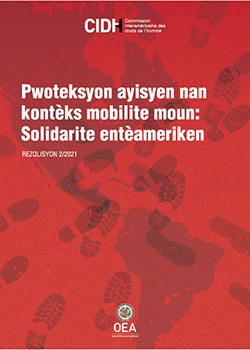
Press Release
IACHR Issues Resolution on the Protection of Haitians in Human Mobility Contexts
November 30, 2021
Related Links
Contato de imprensa
Imprensa da CIDH
Lista de distribuição
Washington, D.C. – The Inter-American Commission on Human Rights (IACHR) is issuing the resolution "Protection of haitians in human mobility: Inter-American solidarity". This resolution seeks to provide guidance for States in the region to protect the rights of Haitians who are migrants, refugees, stateless persons, or victims of human trafficking, or who have been displaced. The document reminds States of their international obligations and of the principles of humanitarian assistance, protection, cooperation, and international solidarity.
In this resolution, the Commission addresses the main factors for and causes of Haitians' human mobility in the Americas, as well as the obstacles they face to effectively access and enjoy their rights in their countries of origin, transit, destination, and return. This analysis is based on continuous monitoring of the situation of human rights in Haiti, particularly through the IACHR's Rapid and Integrated Response Coordination Unit for Haiti, created in February 2019.
In its considerations, the Commission notes the humanitarian crisis and the violent context faced by millions of Haitian individuals and families, and the prevailing challenges in terms of citizen security, democratic institutions, and responses to socio-environmental disasters in the country. States in the Americas are reminded of various international and inter-American treaties, instruments, and conventions. The resolution stresses the duty to protect and to provide humanitarian assistance and solutions with a gender perspective, given the vulnerability of Haitians, particularly women, adolescents, and children, who are exposed to higher risks of violence including human trafficking and sexual and labor exploitation.
Successive movements of Haitian individuals and families are caused by the interaction of structural factors prevalent in the State of which they are citizens, changes in social contexts, and policies in other countries. This poses challenges for the institutional capacity of all countries in the Americas, of host communities, and of civil society organizations. It could have long-term consequences, which highlights the importance and applicability of this resolution. The document reflects the Commission's mandates to provide advice and make recommendations concerning the comprehensive protection of human rights, based on the American Convention.
In resolutions section, the Inter-American Commission makes a series of recommendations to Member States of the Organization of American States (OAS), on issues like international solidarity and cooperation; transparency and sustainability; protection, entry, transit, and exit mechanisms; border human security; the fight against xenophobia and discrimination; and the right to information.
The Commission reminds States that international solidarity is crucial to enforce the universal and primary nature of human rights in contexts like Haiti's—requiring coordinated action—given structural crisis scenarios that affect the human rights of Haitians throughout the Americas. The IACHR expresses its willingness and disposition to provide technical assistance to the State of Haiti and to other States in the region, as well as to regional organizations, social organizations, and other institutions, to strengthen frameworks and policies concerning human mobility. The Commission invites States to implement the recommendations made in this resolution.
A principal, autonomous body of the Organization of American States (OAS), the IACHR derives its mandate from the OAS Charter and the American Convention on Human Rights. The Inter-American Commission has a mandate to promote respect for and to defend human rights in the region and acts as a consultative body to the OAS in this area. The Commission is composed of seven independent members who are elected in an individual capacity by the OAS General Assembly and who do not represent their countries of origin or residence.
No. 319/21
2:00 PM




